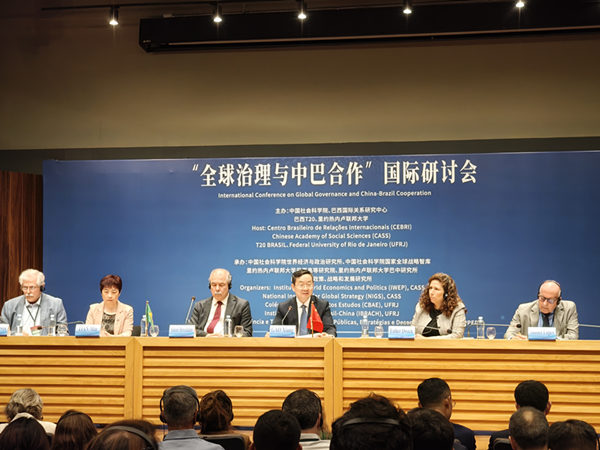


China-Brazil ties continue to deepen amid global shifts

A scene of the conference
RIO DE JANEIRO—On Oct. 14, the “International Conference on Global Governance and China-Brazil Cooperation,” a G20 think tank forum, was convened in Rio de Janeiro, Brazil. Over 100 experts, scholars, and entrepreneurs from China and Brazil engaged in extensive discussions on topics including “multilateralism and global governance,” “sustainable and innovation-driven development,” and “China-Brazil cooperation towards the future.”
Addressing the opening ceremony, Gao Xiang, president of the Chinese Academy of Social Sciences (CASS), noted that this year marks the 50th anniversary of the establishment of diplomatic relations between China and Brazil. Under the strategic guidance of the two countries’ heads of state, high-level bilateral exchanges have become increasingly close, deepening strategic mutual trust and advancing practical cooperation continuously.
The China-Brazil relationship has set a new example of strategic mutual trust among major developing countries, and bilateral cooperation has opened up new space for the common development of emerging economies, as the two nations work together to inject new impetus into the refinement of global governance, remarked Gao. At the 50th anniversary of the establishment of diplomatic ties, the relationship has presented even broader prospects, and the two sides’ further strategic planning and promotion of bilateral cooperation are poised to elevate the building of a China-Brazil community with a shared future to new heights.
Gao pointed out that in today’s turbulent and intertwined international landscape, China and Brazil, both important members of the Global South, hold similar stances on a series of major issues concerning world peace and development. On multilateral platforms such as the United Nations, the G20, and BRICS, the two countries have worked closely together to oppose unilateralism and bloc confrontation, defend international fairness and justice, and advocate for more just and equitable global governance.
The G20 Leaders’ Summit, which will be held in Rio de Janeiro in November, is of great significance for strengthening multilateral cooperation and improving global governance under the new circumstances, Gao said, adding that Chinese and Brazilian think tanks will leverage their research advantages and insights to encourage the G20 to focus on development and cooperation, thereby contributing to global economic recovery and sustainable development.
The world is facing many severe challenges, as the geopolitical situation is complex and changeable, and unilateralism and protectionism are impacting global trade, said Aloizio Mercadante, president of the Brazilian Development Bank. As the Global South navigates development opportunities as well as risks and challenges, the enhancement of strategic cooperation between China and Brazil is of great global significance. China has pursued an open and win-win policy, adding momentum to world peace and development.
Esther Dweck, Brazilian minister of Management and Innovation in Public Services, stressed that China-Brazil relations have embraced a big moment this year, and the policy departments and think tanks of the two sides should intensify communication and dialogue, further consolidate the foundation of cooperation, explore how to effectively unlock the potential of cooperation in economic reform and transformation, and open up new space for common development in the fields of new energy development, digital empowerment, and ecological and environmental protection.
Brazilian President Luiz Inacio Lula da Silva attaches great importance to fighting against hunger and poverty, and Brazil is willing to learn from China’s successful poverty reduction strategies to enhance inclusive development, Dweck said.
According to Luiz Ildefonso Simões Lopes, vice president of the Brazilian Center for International Relations Studies (CEBRI), the CEBRI has closely followed China’s reform and development, instituting a “China Studies Project” in 2017. He emphasized that China has embarked on a Chinese path to modernization based on its specific realities, serving as an inspiration to other developing nations.
Since the establishment of diplomatic relations between China and Brazil half a century ago, bilateral cooperation in the political, economic, cultural, and other fields has achieved fruitful results, said Tian Min, Consul General of China in Rio de Janeiro. At this new historical starting point, the future for China-Brazil cooperation is becoming brighter, and the enhanced cooperation between both sides on major issues such as reforming the global governance system, coping with climate change, and achieving sustainable development will certainly contribute positively to the building of a human community with a shared future.
In the view of Luiz Augusto de Castro Neves Embaixador, president of the Brazil-China Business Council, despite the challenges posed by the COVID-19 pandemic and the backlash against globalization, China and Brazil have maintained robust momentum in economic and trade investments, reflecting the high complementarity and strong resilience of the two nations. He noted that the business communities in both countries have advocated for building an open world economy and improving global economic governance based on the principle of extensive consultation, joint contribution, and shared benefits, while continuously promoting the liberalization and facilitation of international trade and investment.
At the opening ceremony, Gao presented the CEBRI and the Federal University of Rio de Janeiro (UFRJ) with the first four volumes of the Portuguese-edition Xi Jinping: The Governance of China, along with a number of academic treatises from various disciplines of philosophy and social sciences in China.
The conference was co-hosted by CASS, the CEBRI, the T20 Brazil, and the UFRJ. It was jointly organized by the Institute of World Economics and Politics and the National Institute for Global Strategy at CASS, the Institute for Advanced Studies and the Brazil-China Center at the UFRJ, and the Brazilian Institute of Science and Technology Policy, Strategy, and Development. As a supporting activity of the conference, a book exhibition themed “Global Governance and China-Brazil Academic Exchanges” was held.
Editor:Yu Hui
Copyright©2023 CSSN All Rights Reserved